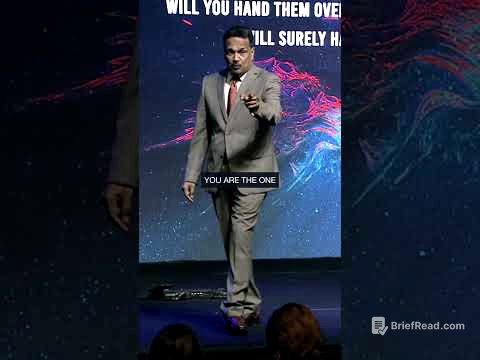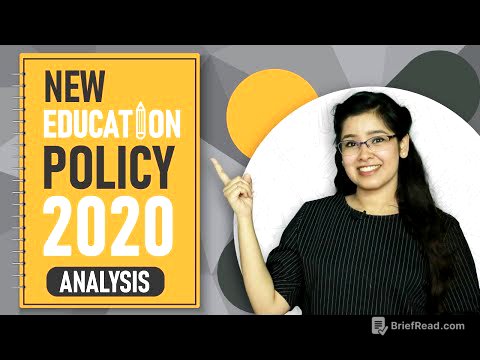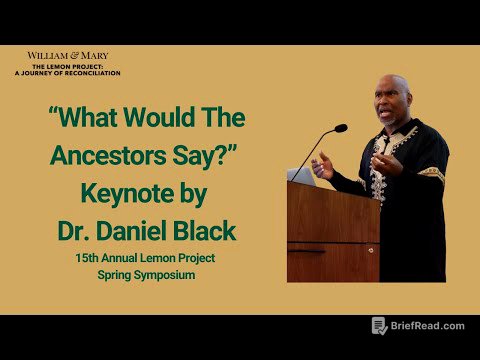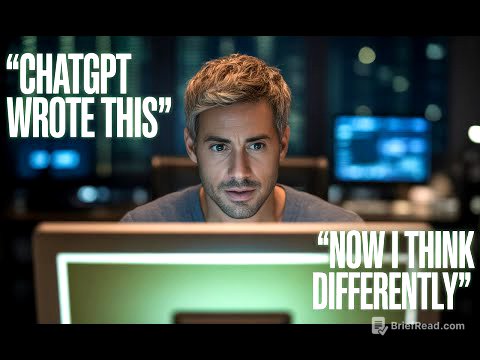TLDR;
This video discusses the disparities in upbringing and education between the rich and the poor, arguing that these differences significantly impact future success. It highlights how rich kids are taught time management, emotional intelligence, and practical skills from a young age, while poor kids often face trauma through limited knowledge and a focus on saving money. The video encourages viewers to critically assess their current education and skill set, urging them to focus on practical knowledge and adding value in their chosen fields rather than blindly following traditional paths.
- Upbringing and education disparities impact future success.
- Rich kids learn time management, emotional intelligence, and practical skills early.
- Poor kids often face trauma through limited knowledge and a focus on saving money.
- Critical assessment of education and skills is crucial.
- Focus on practical knowledge and adding value in chosen fields.
Introduction: The King's Son [0:00]
The speaker introduces the topic by contrasting the lives of the wealthy, such as Anant Ambani and Alia Bhatt, with those of the average person. He points out that despite lacking certain etiquettes or knowledge, the children of the rich often succeed due to their upbringing and mindset. The speaker acknowledges that criticizing parents is a sensitive topic but emphasizes the importance of critical thinking in understanding the differences between the rich and the poor.
Childhood Education: Sacrifices and Limitations [1:31]
The speaker reflects on the sacrifices made by middle-class parents to provide education for their children, such as saving money and enrolling them in schools. He explains the rationale behind teaching all subjects from 1st to 10th grade: to allow children to discover their interests and to provide essential knowledge for survival. Despite the value of this education, the speaker notes that the Indian education system lags behind other countries, citing the example of Chinese children creating AI models at a young age. He then promotes Mirai School of Technology as a college that bridges this gap by focusing on real-world tools and projects.
Home Schooling: Trauma vs. Education [4:28]
The speaker contrasts formal education with homeschooling, describing how parents instill values and beliefs in their children. He argues that for many, this homeschooling can be a form of trauma, as parents with limited knowledge and exposure pass on their fears and survival instincts. This protective mindset prevents children from exploring beyond their comfort zones. In contrast, rich kids receive actual education at home, learning from mentors and gaining exposure to different perspectives.
Society: Instant Solutions and Different Problems [6:10]
The speaker discusses the influence of society, including friends, environment, and social media, on shaping individuals. He notes that while society offers instant solutions to problems, the problems faced by the rich and the poor are vastly different. For example, rich kids may worry about not being invited to a TV show, while poor kids struggle with financial issues. These differing problems lead to different paths and outcomes.
Alia Bhatt's Example: Freedom and Exposure [6:43]
Using Alia Bhatt as an example, the speaker illustrates how rich kids benefit from freedom and exposure from a young age. Unlike typical schooling, Alia Bhatt's parents prioritized a good environment and allowed her the freedom to miss school for extended periods. She started acting classes at age four and debuted in a movie at age six, highlighting the opportunities and training she received early in life. The speaker emphasizes that this type of homeschooling focuses on developing skills and awareness rather than just academic knowledge.
Time Management and Prioritization: Lessons from the Rich [9:32]
The speaker contrasts the time management skills of the rich and the poor. He points out that while middle-class mothers work hard doing household chores, the monetary value of their labor is relatively low. In contrast, rich people are taught to prioritize their time and focus on high-value activities, delegating low-value tasks to others. Using Mukesh Ambani as an example, the speaker explains how the rich make money from money by investing in businesses and hiring capable people to manage them.
Making Money from Money: The Rich Mindset [12:31]
The speaker contrasts how rich and poor families approach finances. Rich families focus on making money from money, while poor families focus on saving small amounts, often wasting time and energy in the process. This difference in mindset gives the rich an unfair advantage, as they gain knowledge and skills that take others decades to acquire.
Emotional Intelligence and Environment: Key Differences [13:38]
The speaker highlights the importance of emotional intelligence, which is taught to rich kids through homeschooling. They learn how to control their emotions, behave in front of people, and navigate social situations. In contrast, poor kids are often influenced by social media trends and lack the guidance to develop these skills. The speaker also notes that the environment plays a crucial role, with rich kids facing different problems and finding instant solutions that don't ruin their careers.
College Education: A Critical Assessment [15:54]
The speaker questions the value of traditional college education, noting that many graduates end up working in fields unrelated to their studies. He urges viewers to critically assess their education and determine whether they are acquiring practical skills that will add value in the market. The speaker advises focusing on practical knowledge and hustling in the industry, even if it means foregoing exams or traditional degrees.
The Importance of Practical Knowledge and Skills [17:42]
The speaker criticizes the Indian education system for not teaching essential life skills, such as law and taxes. He shares an anecdote about a friend who faced tax penalties due to a lack of knowledge, highlighting the disconnect between academic learning and real-world application. The speaker argues that education should focus on practical knowledge and skills that are necessary for survival and success in the country.
Mindset and Action: Breaking the Cycle [21:05]
The speaker emphasizes that the biggest problem is trusting a flawed education system. He encourages viewers to break free from this mindset and focus on acquiring meaningful learnings and practical skills. The speaker warns that AI is rapidly advancing, making it even more crucial to develop skills that add value in the market. He urges viewers to make difficult decisions, focus on practical knowledge, and strive to become kings in their own right.
Final Thoughts: It's Not Too Late [23:57]
The speaker concludes by acknowledging that it's late but not too late to change one's life. He encourages viewers to work on themselves and focus on personal growth. Despite anticipating criticism, the speaker hopes that his message will inspire at least one person to take action and improve their life.









